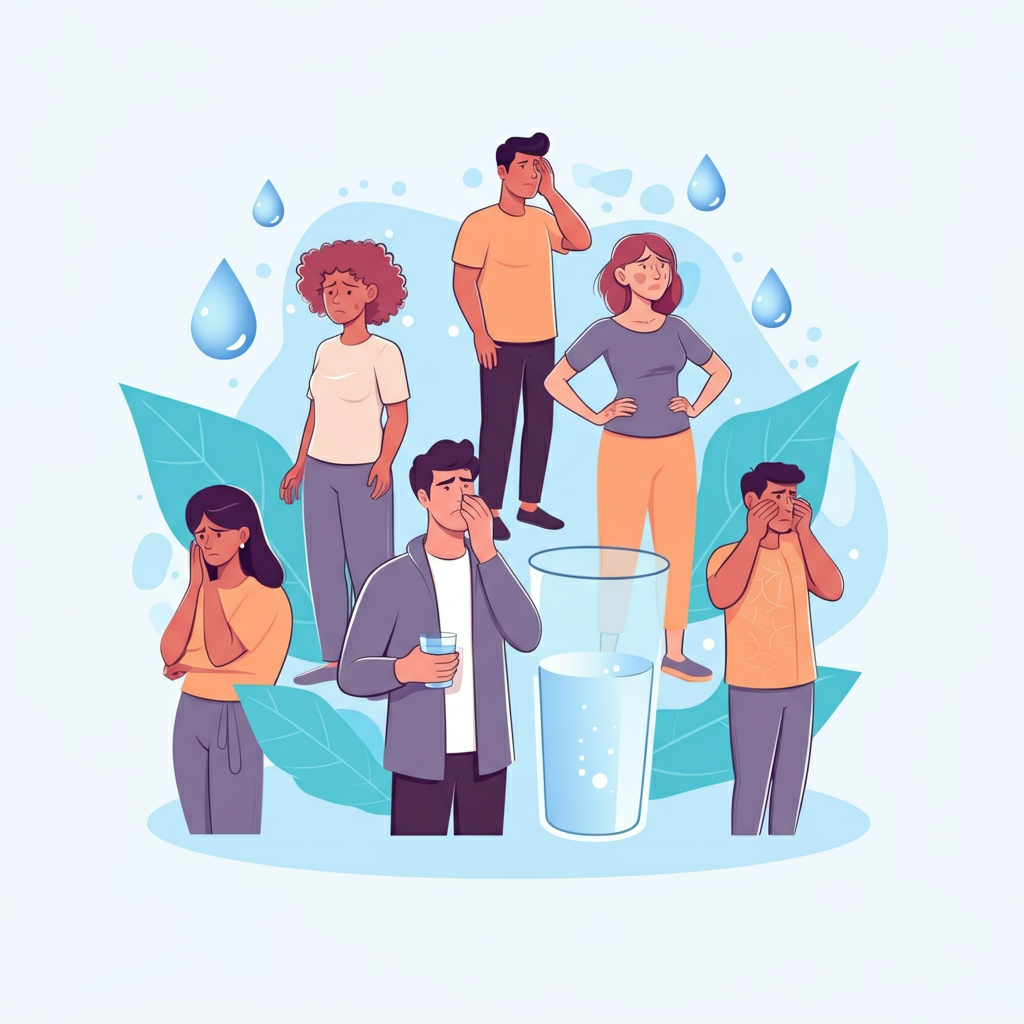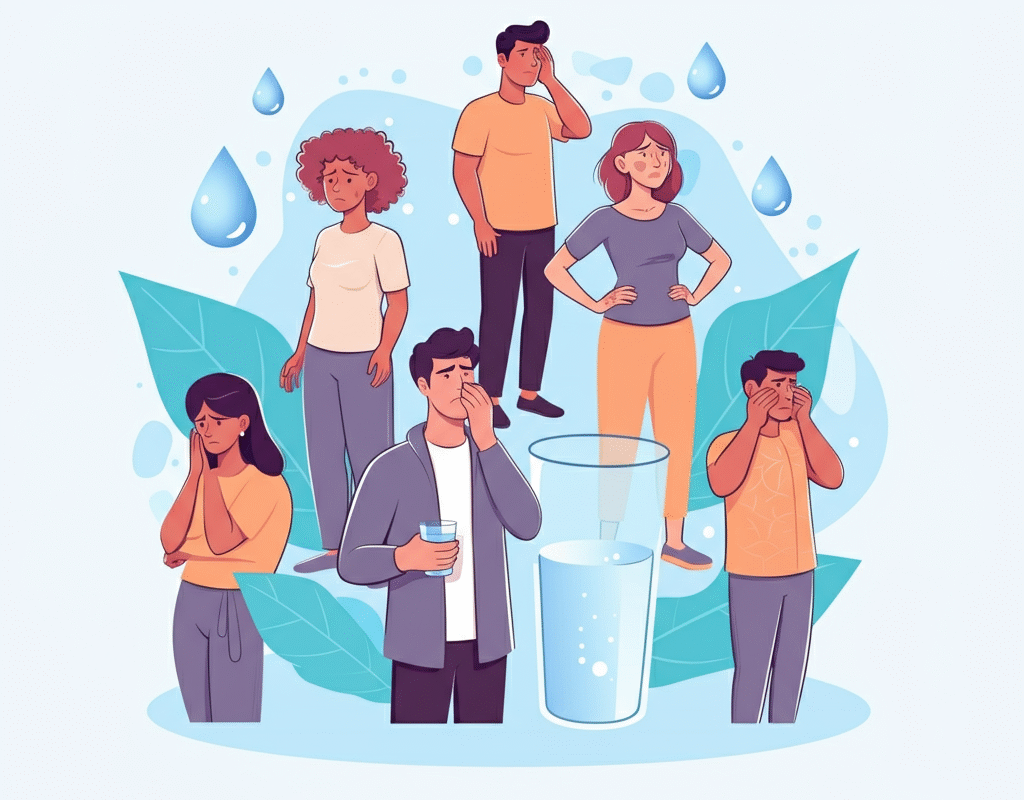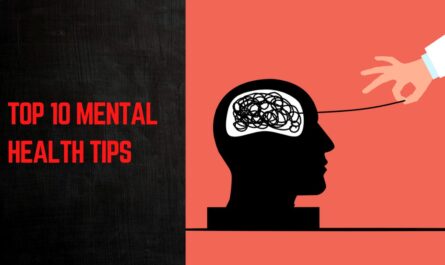How to Know If You’re Dehydrated (And What to Do About It)
Signs of Dehydration: Water keeps us alive, energized, and functioning. But what happens when you don’t drink enough of it? Dehydration is sneaky, and its effects can range from mild discomfort to serious health risks. Wondering how can you feel if you’re dehydrated? Don’t worry we’ve got you covered.
This post will explore what are signs of dehydration, how to recognize chronic dehydration symptoms, what does dehydration feel like, and how to fix dehydration fast at home. Plus, we’ll share tips on how to stay hydrated and avoiding dehydration in the first place. Let’s quench that thirst for knowledge!
What Are the Signs of Dehydration?
Dehydration happens when your body loses more fluids than it takes in. This imbalance interrupts normal bodily functions. Here are 10 sign of dehydration you shouldn’t ignore and know if you are dehydrated:
- Extreme Thirst: Feel like you can’t drink enough water? Yep, that’s a big red flag for dehydration. Extreme thirst causes a strong urge to drink.
- Dry Mouth and Lips: Constantly reaching for lip balm? That dry feeling could be dehydration talking.
- Dark Yellow Urine: If your pee looks more like apple juice than lemonade, it’s time to grab a glass of water.
- Fatigue: Feeling unusually tired or sluggish? Lack of water impacts your energy levels.
- Headaches: Dehydration can cause headaches or even migraines.
- Dizziness: Feeling lightheaded? Dehydration can mess with your blood pressure and lead to dizziness.
- Muscle Cramps: Not just for gym-goers! Cramps can also be caused by a lack of hydration.
- Dry or Cool Skin: Hydrated skin glows. Dehydrated skin? Not so much.
- Rapid Heartbeat: Your heart might have to work harder if your body is low on fluids.
- Confusion or Irritability: Dehydration impacts mental clarity and mood, sometimes leaving you foggy or cranky.

Chronic Dehydration Symptoms
Miss one glass of water, and your body will forgive you. But chronic dehydration symptoms are a different beast. When you’re not drinking enough water over time, the signs blend into your daily life, making them harder to spot. These long-term symptoms include:
- Poor focus and brain fog
- Digestive problems like constipation
- Dry eyes
- Persistent fatigue or low energy
- Frequent headaches
What Does Dehydration Feel Like?
What does dehydration feel like at various stages? At first, you may only feel thirsty or have a dry mouth, making it seem like no big deal. But as it worsens, you could experience muscle cramps, dizziness, or confusion. Some people even describe dehydration as feeling like they’re “burnt out” or having heavy limbs.
Severe dehydration leads to serious symptoms, such as:
- Rapid breathing
- Very dark urine or no urination at all
- Weak pulse
- Loss of consciousness (in extreme cases)
If you’re experiencing severe dehydration, seek medical help immediately.
How to Tell If You’re Dehydrated in Specific Groups
Different groups of people experience dehydration a bit differently. Here’s how to tell if you’re dehydrated in more vulnerable groups:
Signs of Dehydration in Infants and Toddlers
- Fewer wet diapers than usual
- Sunken soft spot on the head
- Irritability or lethargy
- No tears when crying
Signs of Dehydration in Kids
- Dry tongue and lips
- Sleepiness or fatigue
- Complaints of feeling dizzy or lightheaded
Symptoms of Dehydration in the Elderly
- Difficulty swallowing water
- Dry skin that doesn’t bounce back when pinched
- Muscle weakness or cramps
- Confusion or altered mental state
Diseases That Cause Dehydration in Adults
Dehydration doesn’t always come from simply skipping water. Specific health conditions can increase your risk, such as:
- Diabetes (due to frequent urination)
- Diarrhea and Vomiting (leading to fluid loss)
- Kidney Disease (affecting how fluids are retained)
- Fever (causing your body to lose moisture)
Conditions like diarrhea are especially tricky. Does diarrhea cause dehydration? Absolutely, and it’s one of the leading causes of dehydration worldwide.
What Happens If You Don’t Drink Enough Water?
Skipping water for too long can have a domino effect on your health. Here’s a glimpse into what happens if you don’t drink enough water:
- Your blood pressure may drop. Many ask, “Can dehydration cause low blood pressure?” or “Does dehydration cause low blood pressure?” The answer is yes. Without enough water, your blood volume decreases, leading to low pressure and dizziness (hypovolemia symptoms).
- Your digestion slows down, making constipation common.
- Your body will struggle to regulate temperature, leaving you overheated.
- Your organs can take damage, especially your kidneys.
Side effects of not drinking enough water can lead to severe complications over time, turning a simple fix into something much harder to address.
How to Fix Dehydration (And Fast!)
- Drink Water (obvious, right?): Reach for plain water because it’s the simplest solution.
- Add Electrolytes: Opt for electrolyte-rich beverages like coconut water or oral rehydration solutions. What helps with dehydration often includes electrolytes.
- Eat Hydrating Food: Snag fruits and veggies with high water content, such as watermelon, cucumber, and oranges.
- Avoid Dehydration Triggers: Limit caffeine and alcohol, as both are diuretics.
Pro tip for mild dehydration? Sports drinks like those high in electrolytes can help, but what’s the best drink for dehydration? Sometimes, experts argue, it’s plain water with a pinch of salt and squeeze of lemon! to cure dehydration fast at home often involves these simple steps.
How Can I Drink More Water?
Struggling to drink enough? Don’t worry, you’re not alone! Here’s how to drink more water every day:
- Carry a water bottle everywhere.
- Set reminders on your phone or use hydration apps.
- Flavor your water with fruit or herbs if plain water bores you.
Small changes can make a big difference and help you stay hydrated long-term.
Final Thoughts on Staying Hydrated
Hydration water isn’t just about avoiding thirst it’s about optimizing how your mind and body function. Whether it’s spotting the signs of dehydration in kids, addressing body not absorbing water symptoms, or simply wanting to know the best drinks for dehydration, there’s a lot you can do today to feel your best.
Not drinking enough water causes more than discomfort it can impact your health significantly over time. Start by sipping smarter now. If you’re experiencing symptoms of overhydration or dehydration, consult a healthcare provider. What does water do to the body negatively in excess? dilutes your blood and decreases the electrolytes in your body, especially sodium (hyponatremia).
Remember, staying hydrated doesn’t just mean gulping water when you’re thirsty it’s about making it a lifestyle. Drink up, and don’t forget to share this post to help others stay hydrated too!




One thought on “How to Know If You’re Dehydrated (10 Signs & Fixes)”